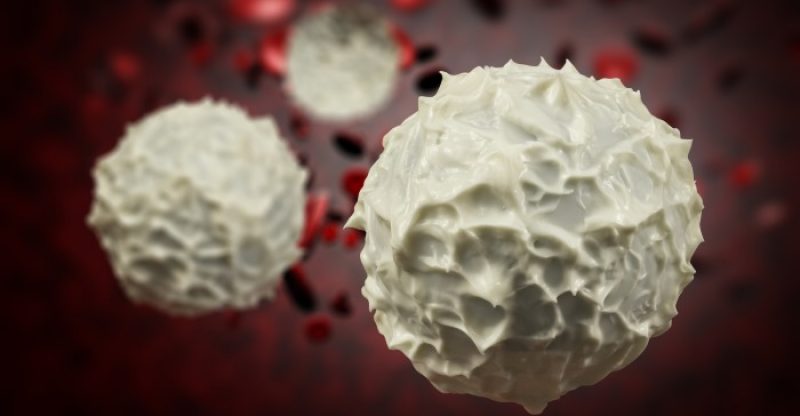Dangers of High or Low White Blood Cell Count (and How to Fix it)
White blood cells are the warriors of your immune system, fighting off invading diseases and infections.
Certain types of white blood cells work to decrease inflammation.
In fact, you have five types of white blood cells that are all tasked with keeping your immune system functioning optimally.
When that doesn’t happen, however, serious problems will arise.
If your white blood cell count is too high, knowing what is causing this can greatly aid you in your quest to reduce your WBC count to an optimal range.
Read on to find out how to keep your WBC count in check.
What are White Blood Cells?
White blood cells (otherwise known as leukocytes) are a collection of cells that help regulate your immune system.
There are five types of WBCs: basophils, eosinophils, neutrophils, lymphocytes, and monocytes (1).
Leukocytes are responsible for controlling allergic reactions, inflammatory responses, destroying foreign invaders, and expelling dead cells.
Unfortunately, when you have a high or low white blood cell count, the consequences can become severe.
Those with an extremely low white blood cell count will be exponentially more vulnerable to illness, while a high WBC count can be indicative of the presence of a serious disease or disorder.
Why is Having a High White Blood Cell Count Dangerous?
Too much of a good thing is actually bad when it comes to your WBCs.
There are several reasons why you do not want to have a high WBC count.
First, WBCs are perpetrators of oxidative stress, which is the result of free radicals not being efficiently neutralized by your body’s antioxidants.
They also tend to clog up your arteries, causing plaque build-up around the heart.
This can ultimately lead to a heart attack.
In larger amounts, WBCs can thicken your blood.
They also may interfere with proper blood flow and boost the number of pro-inflammatory cytokines in your system, thereby causing more noticeable and widespread inflammation.
Additionally, WBCs participate in quite a few other bodily processes, including forming foam cells in plaque.
And they’re recruited from the area where an endothelial injury occurs, and ultimately lead to endothelial dysfunction.(2)
What is the WBC Optimal Range?
Doctors tend to talk a lot about a normal WBC range when assessing lab work.
However, you can be within a normal range for WBC counts but still have an elevated level.
You want to be within the optimal range.
As one study found, there is a correlation between mortality rates and high WBC counts (3).
In this study, researchers found that participants had a higher mortality rate if their WBC counts were below 3,500 (3.5) or above 6,000 (6.0).
In other words, you should have a WBC of somewhere between 3.5 and 6.0, in order to fall into an optimal range.
You will need to be tested to see if you are in an optimal or normal WBC range.
A Japanese study found that individuals whose WBC count ranges between 9,000 and 10,000 are 3.2 times more likely to die from a cardiovascular complication (4).
What Do High WBCs Have to Do with Disease?
High WBCs Cause Dialysis Issues
High WBCs can be bad news for those on dialysis.
This is due to the fact that an elevated count of neutrophils causes inflammation and malnutrition.
Along with a decreased lymphocyte count, an elevated neutrophil level serves as a predictor for a higher mortality risk in patients undergoing hemodialysis (5).
High WBCs are Linked to Cancer
Multiple studies have associated high WBC counts with cancer-related deaths (6).
A particularly noteworthy 2006 study from Singapore and Australia found that the higher a person’s WBC count was, the greater their cancer mortality risk.
Researchers also noted that there seems to be a strong connection between localized inflammation processes and tumor progression (7).
High WBCs Lead to Heart Disease
There is no avoiding the notion that heightened WBCs are linked to cardiovascular diseases and are a strong predictor of an increased risk of death.
As a study conducted in 2001 shows, those admitted to a hospital within 24 hours of a heart attack had high WBC counts (8).
The individuals in the highest 20% WBC count were more likely to die within 30 days of admittance.
Furthermore, studies have discovered that excessive WBCs in circulation throughout the body elevate the amount of oxidative stress involved in heart failure (9).
High WBCs are Linked to Diabetes
If you have an elevated WBC count, there is a good chance that you will also develop Type 2 diabetes (10).
As a study on Pima Indians shows, over time, chronic inflammation might lead to issues with insulin sensitivity and, eventually, diabetes.
This seems to agree with the general hypothesis that chronic immune system activation plays a role in Type 2 diabetes.
High WBCs Can Lead to Death
Unfortunately, there is concrete scientific evidence that links high WBCs to the risk of mortality from all causes of elevated WBCs (11).
Multiple studies demonstrate that a high WBC count is a major predictive factor, and one study shows that a total WBC count is a strong predictor in older adults.
Of all the WBCs, monocytes seem to provide the most telling prediction.
Lifestyle Activities that Exacerbate WBC Levels
Smoking
Of the different lifestyle activities that elevate WBCs, smoking is probably the most obvious.
Male smokers tend to have higher WBC counts than non-smokers and former smokers.
Also, heightened WBCs are dependent upon the number of cigarettes smoked, how long smoking has occurred for, and how much smoke gets inhaled (12).
Cold Temperatures
A somewhat surprising cause of an increase in WBCs is exercising in cold temperatures.
Doing this creates, in particular, a spike in neutrophils, monocytes, and lymphocytes (13).
These numbers do typically return to normal after you have finished exercising, as the spike is mostly due to an increase in neutrophils during exercise.
However, if you have consistently high WBC counts, you might want to avoid exercising in the cold for an extended period.
The Sauna
Another temperature extreme, in the form of a sauna, is shown to elevate WBCs.
If you have a naturally low white blood cell count a sauna visit could prove therapeutic.
However, for those with high WBC counts, this could be problematic.
A study of Finnish sauna visits revealed that athletes who visited the sauna experienced increased levels of basophils, neutrophils, and lymphocytes (14).
As it turns out, heat sauna acts similarly to exercise, but athletes are able to mobilize cells in the immune system more quickly than non-athletes, due to their training.
Heavy Resistance Exercise
When studying male weight trainers, researchers noted that WBC levels increased.
While heavy resistance exercise might be beneficial for someone with low WBC, it exponentially increases your leukocyte count and so isn’t ideal for someone with a high WBC count (15).
The study also showed that elevated WBCs are present in the body during the recovery period after a high-intensity resistance workout.
Nutritional Factors Linked to High WBCs
Zinc
Zinc is essential for the immune system to function properly.
A lack of this nutrient could result in elevated WBCs due to the increase of stress that it promotes, as has been the case in studies conducted on lab mice (16).
Vitamin B12
A B12 deficiency can also be linked to high WBC counts.
In one study, rats who consumed a normal amount of protein didn’t see any WBC changes.
However, those who had a protein deficiency saw a boost in WBCs (17).
Folic Acid
Those who regularly take folic acid supplements, especially women over the age of 60, have been found to have elevated WBC levels.
Fish Oil
Could too much fish oil be a bad thing?
It might be if the results from a study conducted on broiler chicks are valid for humans.
This study found that the birds fed with 5.5% fish oil had higher WBC counts than their peers.
However, having a moderate balance of fish oil and methionine seemed to promote a healthier immune system in the chicks (19).
More testing is required to determine how this interaction might impact humans.
Garlic
Garlic has many health benefits, including boosting WBCs in those with a low count.
Of course, this means that garlic might not be good for those with high WBCs.
In a study conducted on rats, researchers found that the garlic promoted higher levels of neutrophils, monocytes, and lymphocytes.
The statistical difference between this group and the control group was considered significant and warrants further studies on human participants.
Selenium and Vitamin E Injections
Vitamin E and selenium might play a role in WBC counts that are too high or low.
Male rats who were given Selenium, E, or a combined injection all had higher levels than the control group, and human studies have shown that men with selenium deficiencies had high WBC counts (20, 21).
Shark Liver Oil
Shark liver oil is high in fats (known as alkylglycerols) that stimulate the production of WBCs.
Taking this supplement is known to elevate WBCs in humans, which is why it is recommended for those with low WBCs.
Noni Fruit
Studies have shown that Tahitian Noni Juice can boost platelet and blood counts in rats.
It seems to elevate various types of WBCs.
Hormones and Pathways Linked to High WBCs
Insulin
Research has directly linked high WBCs to insulin resistance and elevated insulin concentrations.
The more insulin you have in your system, the higher your WBCs will be (22).
Scientists have also found that the enzyme neutrophil elastase (NE) elevates resistance and blocks insulin signaling.
Deletion of this enzyme in mice led to better insulin sensitivity.
Prolactin
The hormone prolactin is known to stimulate the immune system, thereby increasing WBC counts.
When an individual has a seizure, both their prolactin and WBC levels tend to rise before eventually tapering off (23).
Leptin
Your amount of body fat relates directly to your WBC count due to leptin, a WBC precursor whose job is to stimulate myeloid production.
The more leptin you have, the higher your WBCs will be (24).
Weight loss does have an effect on leptin levels and, therefore, lessens your WBC count.
Cortisol and Glucocorticosteroids
Cortisol (the “stress” hormone secreted by your adrenal glands) and other glucocorticosteroids are known to cause high WBC counts, while decreasing basophils, eosinophils, lymphocytes, and monocytes.
Just one cortisol dosage can decrease monocytes by 90% for about 24 hours after treatment (25).
Adrenaline and Noradrenaline
The neurotransmitters adrenaline and noradrenaline seem to increase WBC counts, as one small study has shown.
However, the extent of their involvement is not yet fully understood (26).
MSH
Melanocyte-stimulating hormones (MSH) are known to do many things, including lowering blood sugar and stimulating thyroid hormones.
They also appear to stimulate the overproduction of WBCs and might explain why high counts are found in those with thyroid and autoimmune diseases.
Thyroid Hormones
If you’ve been diagnosed with a thyroid issue, chances are that your WBC count is off, due to the influence of MSH on the thyroid.
If you have hypothyroid, your WBC count is likely too low.
Those with hyperthyroidism will most likely have high WBCs (27).
Growth Hormones
Growth hormones are often used to stimulate WBC production and other immune cells so as to strengthen the entire immune system.
Even just one injection can boost WBCs.
These injections might be beneficial for those with low, but could be dangerous for those with high, WBCs (28).
IGF-1
IGF-1 is a muscle-builder sometimes used to help those recovering from cancer.
It can quickly boost WBCs and is supposed to make the immune system healthier in those with low WBCs.
What Inhibits WBCs?
Alcohol
Although alcohol consumption isn’t generally advised, it does seem to lower WBCs.
In fact, it has been linked to a reduced risk for cardiovascular disease, when consumed in moderation (29).
A High-Selenium Diet
Eating or supplementing your diet with about 300mg of selenium per day could help lower your WBCs.
Selenium alters your granulocytes (basophils, eosinophils, and neutrophils).
SHGB and Testosterone
Elevated testosterone and sex hormone-binding globulin (SHGB) in middle-aged and older men have been found potentially to contribute to lower WBC counts (30).
Of course, further research is needed to find out why this link exists.
FDA Compliance
The information on this website has not been evaluated by the Food & Drug Administration or any other medical body. We do not aim to diagnose, treat, cure or prevent any illness or disease. Information is shared for educational purposes only. You must consult your doctor before acting on any content on this website, especially if you are pregnant, nursing, taking medication, or have a medical condition.
HOW WOULD YOU RATE THIS ARTICLE?







My blood pallets were 110 should I be concerned and why. I have been very tired lately and this showed up in my test plus low. Calcium?